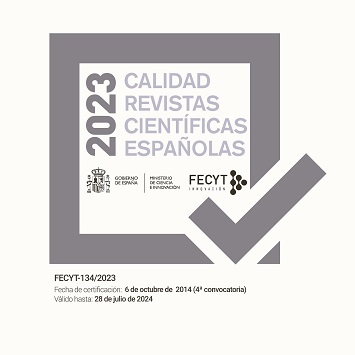El discurso del fin: historia, arte y filosofía
Unterstützung
- Beca predoctoral
- Gobierno Vasco
- Prof. Dr. Julián Pacho
- Universidad del País Vasco
Abstract
Discurrir sobre el final de la historia, del arte o de la filosofía se ha convertido en una actividad frecuente y fructífera en la historiografía filosófica de los últimos decenios. En el presente artículo se analizan el origen, las relaciones y las implicaciones de dichos discursos, siendo su eje la filosofía hegeliana. La tesis principal es que, para salvarlos, han de ser interpretados como afirmaciones performativas.Downloads
Literaturhinweise
BAYNES, Kenneth; BOHMAN, James; McCARTHY, Thomas (1987): After Philosophy: end or transformation?, Massachusetts, MIT Press.
CHÂTELET, François: Hegel según Hegel, Barcelona, Laia.
COOPER, David (1993): «Postmodernism and ‘The End of Philosophy’», International Journal of Philosophical Studies, nº 1 (1), pp. 49-59.
CROCE, Benedetto (1991): «La «fin de l’art» dans le système hégélien», en: Essais d’esthétique, Paris, Gallimard.
CROCE, Benedetto (1997): «La estética del idealismo: Schiller, Schelling, Solger, Hegel», en: Estética como ciencia de la expresión y lingüística general, Málaga, Ágora.
DANTO, Arthur C. (1984): Qué es filosofía, Madrid, Alianza.
DANTO, Arthur C. (1986): The philosophical disenfranchisement of art, Columbia University Press.
DANTO, Arthur C. (1996): After the end of art. Contemporary art and the pale of history, Princeton University Press.
DANTO, Arthur C. (1998): Danto, A., «The end of art: a philosophical defense», History and theory, nº 37 (4), pp. 5-20.
DANTO, Arthur C. (1999): «Hegel’s end of art thesis» http://www.rae.com.pt/Danto%20hegel%20end%20art.pdf
DANTO, Arthur C. (1999): “La alegría de vivir después del fin del arte”, Inter Press Services. Disponible en: http://www.ipsnoticias.net/1999/12/arthur-c-danto-la-alegria-de-vivir-despues-del-fin-del-arte-entrevistas-de-fin-de-siglo/, http://www.ipsnoticias.net/1999/12/arthur-c-danto-la-alegria-de-vivir-despues-del-fin-del-arte-2-e/
DANTO, Arthur C. (2013): Qué es el arte, Barcelona, Paidós.
DE AZÚA, Félix (2005): «Tres líneas de A.C. Danto. Sobre «Narrative and never-endingness»», en Pérez Carreño, Francisca: Estética después del fin del arte. Ensayos sobre Arthur Danto, Madrid, Machado Libros.
ESPOSITO, Joseph L. (1983): «Hegel, absolute knowledge and the end of history», Clio, nº 12 (4), pp. 355-365.
FUKUYAMA, Francis (1989): «The End of History?», The National Interest.
FUKUYAMA, Francis (1992): The end of history and the last man, New York, MacMillan.
HABERMAS, Jürgen (1991): Pensamiento postmetafísico, Madrid, Taurus.
HEGEL, Georg Friedrich Wilhelm (1972): La razón en la historia, Madrid, Seminarios y Ediciones.
HEGEL, Georg Friedrich Wilhelm (1980): Phänomenologie des Geistes, Hamburg, hrsg. von W. Bonsiepen und R. Heede, GW, Bd. 9.
HEGEL, Georg Friedrich Wilhelm (2005): Enciclopedia de las ciencias filosóficas en compendio, Madrid, Alianza.
HEGEL, Georg Friedrich Wilhelm (2010): Fenomenología del espíritu, Madrid: Abada Editores.
HEIDEGGER, Martin (1994): “Superación de la metafísica”, Conferencias y artículos, Barcelona: Ediciones del Serbal, pp. 63-89.
HEIDEGGER, Martin (2000): «El final de la filosofía y la tarea del pensar», en: Tiempo y ser, Madrid, Tecnos, pp. 77-93.
HEIDEGGER, Martin (2000): Nietzsche II, Barcelona: Destino.
JARQUE, Vicente (2005): «Danto, Adorno, Hegel. El arte como cosa del presente», en Pérez Carreño, Francisca: Estética después del fin del arte. Ensayos sobre Arthur Danto, Madrid, Machado Libros.
KOJÈVE, Alexander (2013): Introducción a la lectura de Hegel, Madrid, Trotta.
LÖWITH, Karl (1974): De Hegel a Nietzsche. La quiebra revolucionaria del pensamiento en el siglo XIX, Buenos Aires, Editorial Sudamericana.
LYOTARD, Jean-François (2014): La condición posmoderna, Madrid, Cátedra.
MARKUS, Gyorgy (1996): Hegel and the end of art», The Sydney Society of Literature and Aesthetics, nº 6, pp. 7-26.
PACHO, Julián (2010): “Que la ciencia es y no es un género natural”, en AAVV: Normatividad y praxis: El interés del conocimiento, Ed. E-Prints Complutense (http://eprints.ucm.es/9876/) pp. 8-34.
RIEDEL, Manfred (1978): “Philosophieren nach dem „Ende der Philosophie“?”, in Herman Lübbe (ed.): Wozu Philosophie?, Berlin, de Gruyten.
RIEDEL, Manfred (2000): «Filosofar tras el ‘final de la filosofía’. Sobre la cuestión del pensar en la edad de la ciencia», Éndoxa, nº12, 2000, pp. 33-50.
RIPALDA, José María (2000): «Hegel y el fin del arte», Archipiélago. Cuadernos de crítica de la cultura, nº 41, pp. 29-34.
RORTY, Richard (1982): Consequences of pragmatism, University of Minnesota Press.
RORTY, Richard (2009): La filosofía y el espejo de la naturaleza, Madrid, Cátedra.
SELLARS, Wilfrid (1963): “Philosophy and the scientific image of man”, en Empirism and the Philosophy of Mind. London: Routledge & Kegan Paul Ltd., pp. 1-40.
VATTIMO, Gianni (1987): El fin de la modernidad, Barcelona, Gedisa.
Las obras que se publican en esta revista están sujetas a los siguientes términos:
1. El Servicio de Publicaciones de la Universidad de Murcia (la editorial) conserva los derechos patrimoniales (copyright) de las obras publicadas, y favorece y permite la reutilización de las mismas bajo la licencia de uso indicada en el punto 2.
2. Las obras se publican en la edición electrónica de la revista bajo una licencia Creative Commons Reconocimiento-NoComercial-SinObraDerivada 3.0 España (texto legal). Se pueden copiar, usar, difundir, transmitir y exponer públicamente, siempre que: i) se cite la autoría y la fuente original de su publicación (revista, editorial y URL de la obra); ii) no se usen para fines comerciales; iii) se mencione la existencia y especificaciones de esta licencia de uso.
3. Condiciones de auto-archivo. Se permite y se anima a los autores a difundir electrónicamente las versiones pre-print (versión antes de ser evaluada) y/o post-print (versión evaluada y aceptada para su publicación) de sus obras antes de su publicación, ya que favorece su circulación y difusión más temprana y con ello un posible aumento en su citación y alcance entre la comunidad académica. Color RoMEO: verde.












